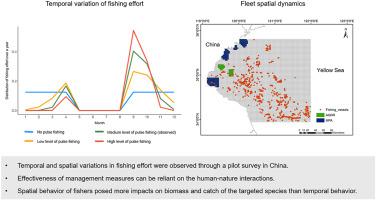Ocean & Coastal Management ( IF 4.8 ) Pub Date : 2021-04-28 , DOI: 10.1016/j.ocecoaman.2021.105665 Yunzhou Li , Ming Sun , Yiping Ren , Yong Chen

|
Fisher behavior has been widely considered important for fisheries management, but is often overlooked in China's fisheries management. The current management scheme creates few incentives to survey fishers, leading to limited behavioral information that further hinders decision-makers from accounting for human-nature interactions in management. To resolve this deadlock, we collected data on temporal and spatial variations in fishing effort from a pilot survey in Haizhou Bay, China, and incorporated this behavioral information in a fishery simulator to evaluate its impacts on the effectiveness of management measures. We selected the commercially important small yellow croaker (Larimichthys polyactis) as the targeted species in this study. Spatiotemporal management measures imposed on the stock were evaluated. Despite the large temporal and spatial scale of China's fisheries closure, our results indicate that the effectiveness of management measures can be reliant on the interaction between fisher behavior and fish population dynamics. In particular, we found that pulse fishing after the seasonal closure could create positive effects on fish biomass and catch because of the unique biology and seasonal migration patterns of the target species as well as its spatiotemporal relationship with fishing activities, which differs from the previous concern when not accounting for such interactions. Additionally, we observed that spatial movement of fishing vessels tended to pose more impacts on biomass and catch of our targeted species compared to pulse fishing, indicating the importance of understanding fleet spatial dynamics in future research and management. To promote the incorporation of behavioral information into China's fisheries management scheme, we advocate extending the current ecology-oriented monitoring programs to include social dimensions, collecting spatiotemporal behavioral data from well-designed fisher monitoring programs, and developing new strategies to cope with uncertainty in fleet dynamics in the upcoming fisheries management reforms.











































 京公网安备 11010802027423号
京公网安备 11010802027423号